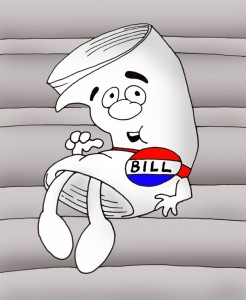Now we’re into the actual reasons the colonists felt they needed to “sever the bonds” with England. It’s a pretty big list, and while it’s not rare for a document of this type (like a request for divorce) to list some frivolous or minor complaints, it’s important to note that most of the specific complaints were addressed in the Constitution, either in the body or the first ten amendments.
He has refused his Assent to Laws, the most wholesome and necessary for the public good.
He has forbidden his Governors to pass Laws of immediate and pressing importance, unless suspended in their operation till his Assent should be obtained; and when so suspended, he has utterly neglected to attend to them.
He has refused to pass other Laws for the accommodation of large districts of people, unless those people would relinquish the right of Representation in the Legislature, a right inestimable to them and formidable to tyrants only.
So, by the time of the Intolerable Acts, the process of passing laws in the colonies had become somewhat ponderous. The colonial legislatures would pass a law they considered very reasonable, say, “Orphans may not be used as fuel.” Then they would send it up to the colonial governor, usually a position appointed by the King. He would pass it with his signature—sort of—then he would send it across the Atlantic for approval. There it would go through Parliament (or at least the Foreign Office) to decide if the law was even worthy of being presented to the King. If it was worthy, it would go, along with any Parliamentary amendments or notes (“Orphans may not be used as fuel. Unless it is very cold.* *This law does not apply to gingers or the Irish.”) The king would then use the law to line his birdcage, because Lord Chirpy-chirp wouldn’t go on common newspaper.
Originally, the Founding fathers fixed this by making the individual states supreme in the new nation, with a national government so laughably weak that the Marvel Cinematic Universe panel at SDCC has more legislative power than Congress under the Articles did. The President under the Articles was such a meaningless figurehead that more people remember Millard Fillmore’s Vice President.
That worked out as well as you’d expect, so they made a Federal government with slightly more teeth, but they still addressed the root causes above. Under the Constitution, states have the right to make their own laws without asking the Fed’s permission, to begin with. More so, the President can’t just sit on a law forever—he has to sign or veto it within a certain time period. If he does veto the law, Congress can overturn that veto (by getting 387 lawyers and hacks to agree on something that may not directly line their pockets). Further, the ninth and tenth amendments clearly state that the Federal Government only has those powers specifically granted by the Constitution, reserving any other powers and rights to the states or the people.
He has called together legislative bodies at places unusual, uncomfortable, and distant from the depository of their Public Records, for the sole Purpose of fatiguing them into compliance with his measures.
He has dissolved Representative Houses repeatedly, for opposing with manly firmness his invasions on the rights of the People.
He has refused for a long time, after such dissolutions, to cause others to be elected; whereby the Legislative Powers incapable of Annihilation, have returned to the People at large for their exercise, the State remaining in the mean time exposed to all the dangers of invasion from without and convulsions within.
This sounds a little nitpicky, on the face of it. “Whah, Whah, the King won’t let State representatives earn a stipend for helping to decide if the state bird should be the Blue Jay or the Prothonotary Warbler.”
Except that’s not the whole thing. Believe it or not, almost every meaningful law that regulates your life is a state law, and federal laws are usually meaningless to everyday living. Also, it helps to remember that, before the rise of the automobile, any trip over thirty miles was at least an over-nighter. I also gather that this meeting-place resetting would happen without notice, so representatives would go to the colonial capital only to learn that they needed to be in West Stinkville, twenty miles up the road.
Of course, moving the legislature was generally less the action of the King himself, and more a thing the appointed colonial governors did, mostly for the reasons stated.
That last paragraph is the kicker, however. Laws are how we humans prevent the worst of us from making hay from the best of us, and they need to be periodically adjusted as they become pointless, or as truly inventive douchebags develop a workaround. Without a recognized government passing and enforcing laws, large-scale societies tend to fall into chaos, and, contrary to what the activities in Boston might lead one to believe, chaos is what they were trying to avoid.


